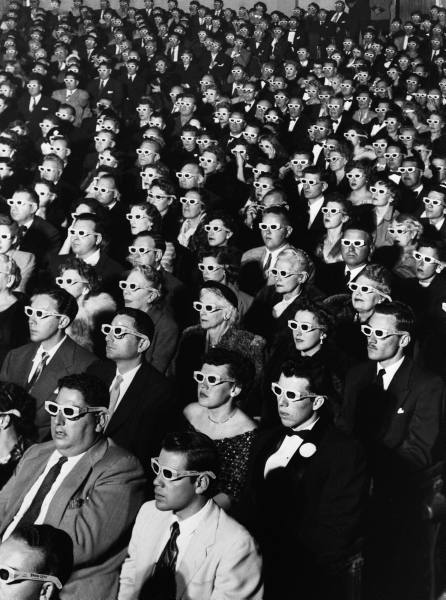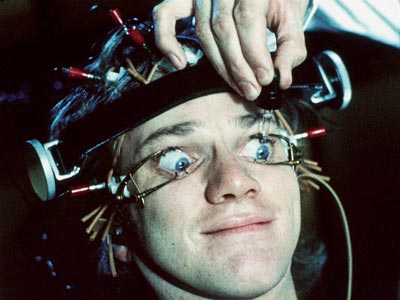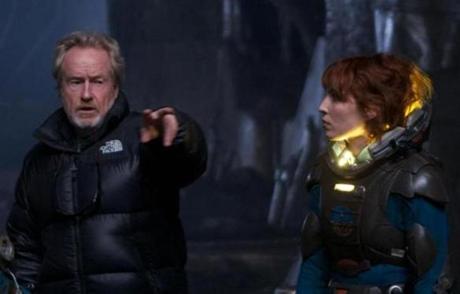“Volunteer” Utilitarians testing Spoil-O-Vision at the Hooded Institute of Technocracy
A Manhattan couple take a taxi to Broadway, where they are set to see the latest whodunnit theater play. As they exit the cab, the driver notes:
“Hey, you haven’t given me a tip!”
“So sue me, asshole,” the man wittily ripostes.
Then the driver leans in, and proclaims:
“THE BUTLER DID IT.”
—old New York joke, and the essence of spoiling
In my recent review of the megaflick Prometheus for this blog, I was bedevilled by the usual pesky need, out of courtesy for the innocent reader, of avoiding “spoilers” — those nuggets of information that can drain away all surprise and suspense from the viewing experience.
When did this obsession with shunning spoilers begin? When Sophocles wrote Oedipus the King, complete with twist ending, his ancient Greek audience was perfectly aware that the sought-for culprit turns out to be the King himself. Didn’t faze them a whit! And children don’t mind at all being told a story to which they already know the end. In fact, they insist on being told their favorites over and over again.
Yet I can’t deny that a spoiler can do just as its name implies, spoil the pleasure of a tale. I still can’t forgive the moronic Newsweek critic who gave away the twist in the film Jacob’s Ladder. Thanks a lot, motor-mouth.
There has to be a way to reconcile the critic’s need to discuss a story and the reader’s expectations of surprise.
In search of a solution, I hied myself off to the forbidding Mt.Berlatsky fortress-like headquarters of the secretive Hooded Institute of Technocracy. There, H.IT.’s semi-deranged genius boffins spent a million man-hours perfecting the answer to my prayers.
The result was Spoil-O-Vision, a technological marvel that is the final coffin for story spoiling!
Your humble servant, Alex, testing Spoil-O-Vision in its beta version.I don’t, I, I do not want to talk about it.
How does it work? Simply drag your mouse’s cursor over the blank space, as you do when you cut ‘n paste text for a plagiarised term paper. Below, for instance, is a spoiler for the aforementioned Jacob’s Ladder:
At the end, we learn that the main character has been dead for years, and the entire movie is his ghost’s delusion of life. A premise ripped off from Ambrose Bierce’s An Occurrence at Owl Creek Bridge, as the Newsweek asshole helpfully pointed out… uh, you HAVE read that Bierce story already, right? No? Oops.
Now I can discuss, say, Agatha Christie’s The Murder of Roger Ackroyd without revealing that
the murderer turns out to be the book’s first-person narrator
And now I can finally disclose those Prometheus spoilers!
Ha! Made you look!!!
At the end of the movie, the surviving crew members penetrate to the heart of the alien citadel of the Engineers, only to find an arena where synthetic life-forms based on characters from ancient Ridley Scott movies fight . Thus darkness from Legend grapples with the Alien, Marcus from Gladiator duels with Feraud from The Duellists, Thelma and Louise trade gunfire with Lucas from American Gangster, while the Blackhawk Down helicopter pursues Deckard in his Blade Runner hovercar. The spectacle is presided over by a 200-year-old Scott, who reveals to the crew that they are also synthezoids, but won’t be needed until the sequel.
But Spoil-o-Vision does have its dark side. Consider the following:
You have just downloaded and activated a copy of the HellHound 3000 virus. If you can read this text, it means your computer has been taken over and your files have been corrupted.
Thank you for having volunteered for this experiment.
Our ..heh, heh…head of research would REALLY like…heh, heh…
to get to know you even better than he already does




